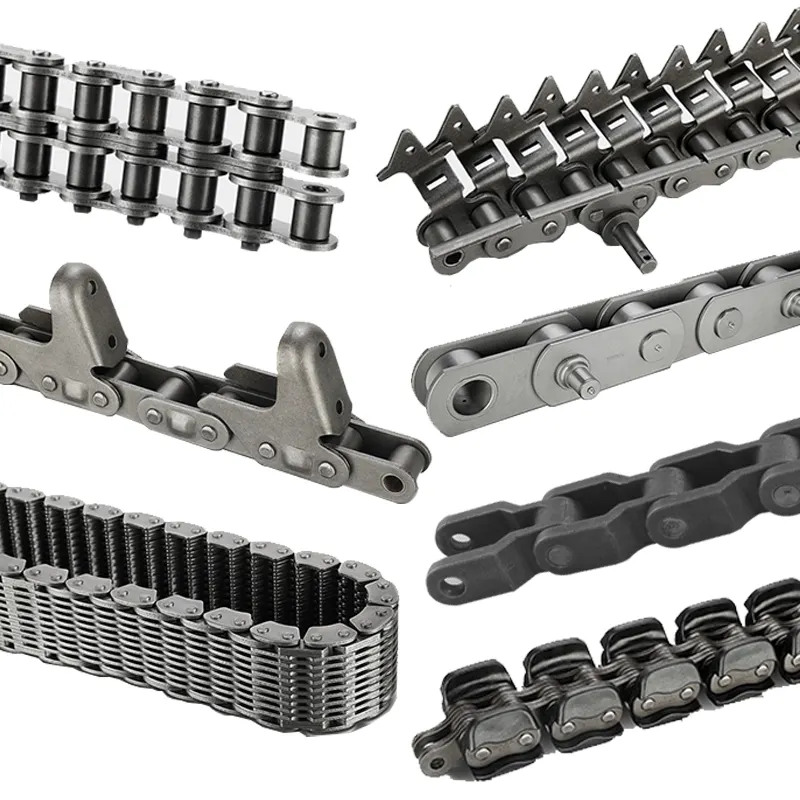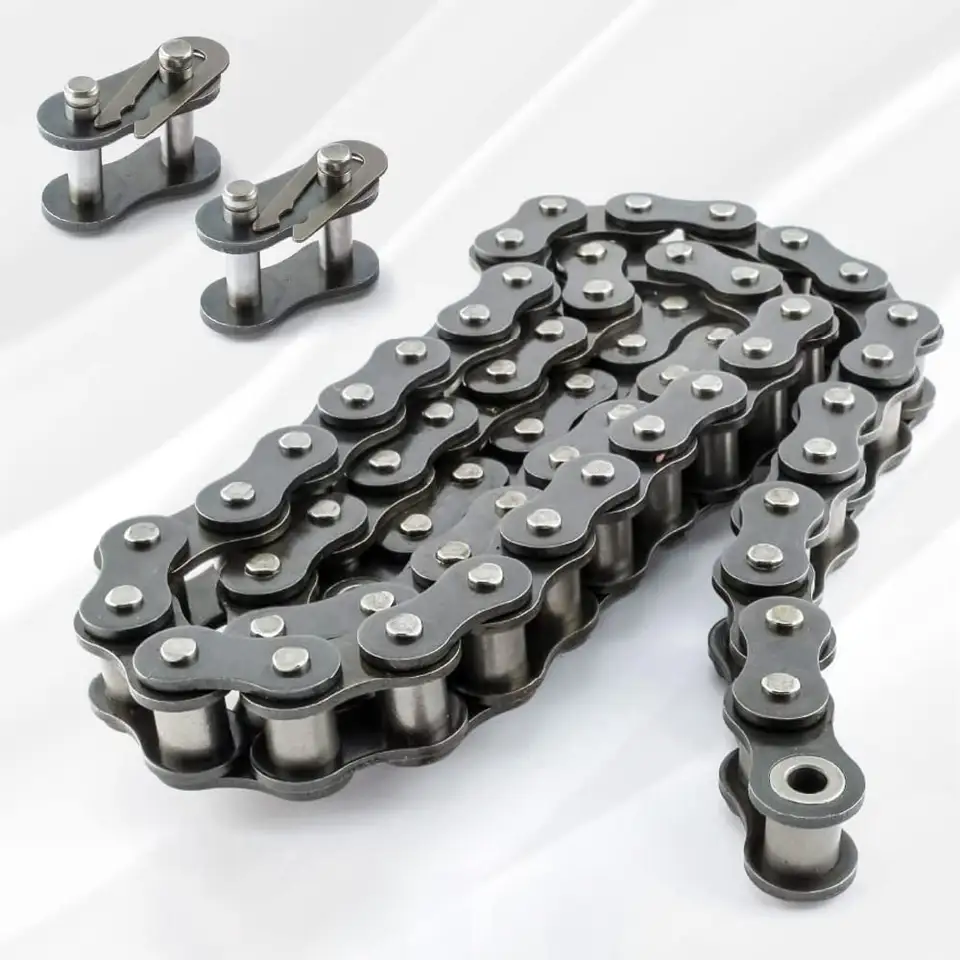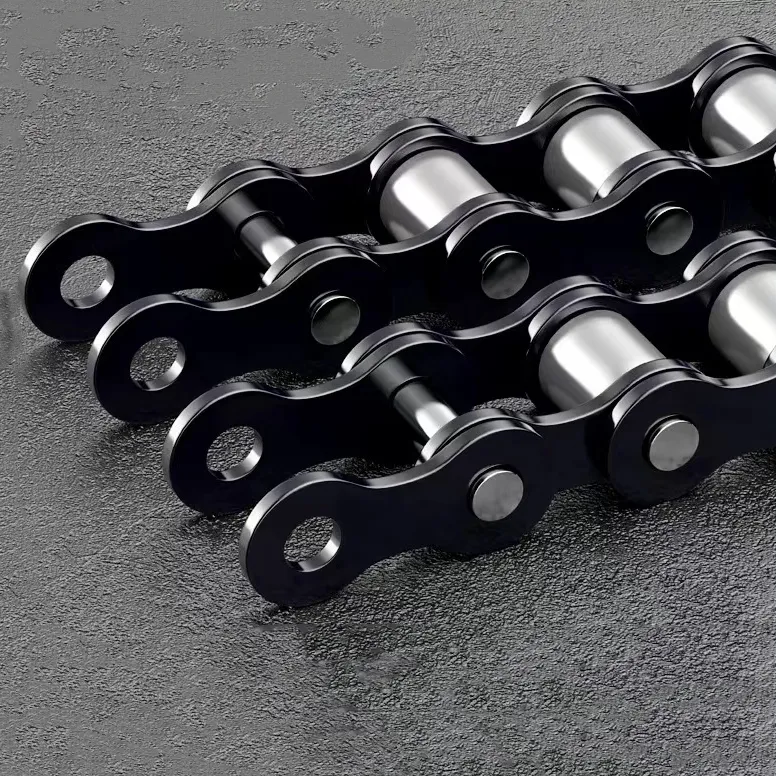Product Description
MODEL NO.: 04B-1, 05B-1,06B-1,08B-1,10B-1,12B-1,16B-1,20B-1,24B-1,28B-1,32B-1,36B-1,40B-1,48B-1,56B-1,64B-1,72B-1;
Simplex(single row)
HangZhou Power Transmission company has specialized producing chains and sprocket products for over
10 years. Rising from domestic market, now with abundant industry experience, it has become an important supplier and exporter in South China, and set up its own qualified brands.
QUALITY is the essence of long term business and support to our customers. Production is strictly controlled from origin, normal material choices : 45Mn, 30GeMnTi, #10, 20Mn, Stainless Steel, Customized material, through strict technique standards of ANSI, DIN, ISO.
| Material chosen | Well wire-cutting |
| Plate shot peening | Bluing |
| Well through heat-treatment | |
| Carburizing | Quenching |
| Tempering | |
| Oiling/greasing | |
| Pre-stretched | |
| Pre-running | |
XMPOWER mainly cover products as below:
| Drive Chains | A Series Short Pitch Precision Roller Chains | B Series Short Pitch Precision Roller Chains |
| Heavy Series Short Pitch Roller Chains | Short Pitch Straight Side Plate chains | |
| Agricultural Chains and Attachments | Oil field Roller Chains | |
| Heavy-duty Cranked link Roller Chains | AB Series Double Pitch Conveyor Roller Chains | |
| Coupling Chains | AB Series Straight Sidebar Roller Chain | |
| Silent Chains | PIV Chains | |
| Conveyor Chains | Double Pitch Stright Side Plate Conveyor Chains (A & B Series) | |
| Double Pitch Large Roller Conveyor Chains (A & B Series) | ||
| Attachments A1, K1, SA1, SK1, WA1, WA2, WK1, WK2, AA1, KK1, SAA1, SKK1, D1, D3, etc. | ||
| Hollow Pin Chains (B/BUSH/ROLLER Type) | Side Bow Roller Chains | |
| Double Flex Chains | Double Plus Chains | |
| Sharp Top Chains | Flat-top Chains | |
| FV/FVT/FVC Series Conveyor chains | M/MT/MC Series Conveyor chains | |
| Side Roller Conveyor Chains | Top Roller Conveyor Chains | |
| Lumber Conveyor Chains | Mining and Metallurgy Conveyor Chains | |
| Leaf Chains | AL Series Leaf Chains | BL Series Leaf Chains |
| LL Series Leaf Chains | ||
| Special Chains | Palm Oil Chains | Sugar Chains |
| Tobacco Machinery Chains | Grain Machine Chains | |
| Beer Bottling Conveyor Roller Chains | Coal Chains | |
| Crawler Asphalt Paver Conveyor Chains | Cold Drink Food Processing Chains | |
| Welded Steel Chains | Water Dispose Chains | |
| Motorcycle | Motorcycle chains | Engine Chains |
| SPROCKETS & Gear | 1045 Steel Sprockets, ANSI/DIN standards | Module Gears |
| Motorcycle sprockets | Bevel Gears | |
| Stainless Steel Sprockets | Customized | |
All CHINAMFG products are strictly checked before delivery to our customers. Tests have been conducted through material till finished product,
XMPOWER’s expertise and commitment will be 1 of best choices as your reliable chain supplier.
In the light of our vision and mission, we constantly value our each partner, and work closely with each other to achieve satisfied solutions. We look CHINAMFG to forging strong partnership with you and ensure long term progress!
| Contact: CHINAMFG Huang/Sales Manager/Transmission Dept. HangZhou POWER TRANSMISSION IMP.& EXP.CO.,LTD Add.: #19 Bldg, #158, Canglindong Rd, Xihu (West Lake) Dis. Industrial Zone, 361000, HangZhou, China. Branch: Yingbin Rd., HangZhou, HangZhou, ZHangZhoug, China Web: xmpower |
| Standard or Nonstandard: | Standard |
|---|---|
| Application: | Textile Machinery, Garment Machinery, Conveyer Equipment, Packaging Machinery, Food Machinery |
| Surface Treatment: | Polishing |
| Samples: |
US$ 0/Foot
1 Foot(Min.Order) | Order Sample |
|---|
| Customization: |
Available
| Customized Request |
|---|
.shipping-cost-tm .tm-status-off{background: none;padding:0;color: #1470cc}
|
Shipping Cost:
Estimated freight per unit. |
about shipping cost and estimated delivery time. |
|---|
| Payment Method: |
|
|---|---|
|
Initial Payment Full Payment |
| Currency: | US$ |
|---|
| Return&refunds: | You can apply for a refund up to 30 days after receipt of the products. |
|---|

Can roller chains be used in low-temperature environments?
Yes, roller chains can be used in low-temperature environments, but there are several factors to consider for their proper performance and longevity:
1. Material Selection: Choose roller chains that are specifically designed for low-temperature applications. These chains are typically made from materials that can withstand the cold temperatures without becoming brittle or losing their mechanical properties. Common materials used in low-temperature roller chains include stainless steel, nickel-plated steel, or special alloys.
2. Lubrication: Proper lubrication is essential in low-temperature environments to ensure smooth operation and prevent excessive wear. However, it’s important to consider the type of lubricant used as some lubricants may become less effective or thickened at low temperatures. Select lubricants that are specifically formulated for low-temperature applications to maintain proper chain lubrication and reduce friction.
3. Temperature Ratings: Check the temperature ratings provided by the roller chain manufacturer. Ensure that the roller chain is suitable for the specific low-temperature range of your application. Different roller chains have different temperature limits, and exceeding these limits can lead to decreased performance, increased wear, and potential chain failure.
4. Impact Resistance: Low temperatures can make materials more susceptible to impact damage. It’s important to ensure that the roller chain selected has good impact resistance properties to withstand any sudden shocks or loads that may occur during operation in low-temperature environments.
5. Environmental Factors: Consider the overall environmental conditions of the low-temperature environment. Factors such as moisture, ice, or freezing conditions can affect the performance of roller chains. In such cases, additional protection measures like sealing, covers, or regular maintenance may be necessary to prevent ice formation or moisture ingress.
6. Regular Inspection and Maintenance: Regularly inspect the roller chains for signs of wear, damage, or inadequate lubrication. Monitor their performance and address any issues promptly. In low-temperature environments, extreme cold can exacerbate any existing issues, so proactive maintenance is crucial to ensure the continued reliability of the roller chains.
By considering these factors and selecting roller chains designed for low-temperature applications, you can ensure their proper functioning and durability in low-temperature environments.

Can roller chains be used in underwater applications?
Roller chains are not typically recommended for direct use in underwater applications due to the potential for corrosion and water ingress. However, with appropriate modifications and additional protective measures, roller chains can be adapted for certain underwater applications. Here’s a detailed answer to the question:
1. Corrosion Resistance: In underwater environments, corrosion is a significant concern. Roller chains can be manufactured from corrosion-resistant materials such as stainless steel or coated with anti-corrosion treatments to mitigate the effects of exposure to water and moisture.
2. Sealing and Waterproofing: Special seals, O-rings, or protective covers can be installed to prevent water ingress into the chain’s internal components. These seals help to maintain lubrication and protect against corrosion, ensuring reliable operation even in wet conditions.
3. Lubrication Selection: Choosing the appropriate lubricant is crucial for underwater applications. Lubricants with excellent water resistance and corrosion protection properties should be selected to provide long-lasting lubrication in the submerged environment.
4. Maintenance and Inspection: Regular maintenance and inspection are essential to monitor the condition of the roller chain in underwater applications. This includes checking for signs of corrosion, lubricant degradation, or seal damage. Prompt replacement of worn or damaged components is necessary to prevent chain failure and ensure optimal performance.
It’s important to consult with experts or manufacturers experienced in underwater applications to determine the suitability of roller chains for specific underwater environments. They can provide guidance on the necessary modifications, materials, and maintenance practices to ensure the safe and reliable operation of roller chains in such conditions.

What are some common causes of roller chain failure?
Roller chain failure can occur due to various factors. Here’s a detailed answer to the question:
1. Insufficient Lubrication: One of the primary causes of roller chain failure is inadequate lubrication. Insufficient lubrication leads to increased friction, heat generation, and wear between the chain’s components, such as pins, bushings, and rollers. Over time, this can cause the chain to seize up, deform, or break.
2. Contamination: Contamination of the roller chain with dirt, dust, debris, or foreign particles can accelerate wear and increase the risk of failure. These contaminants can penetrate the chain’s joints, causing abrasive action and reducing the effectiveness of lubrication. Contamination can also cause corrosion, leading to weakened chain links.
3. Misalignment: Improper alignment of the sprockets and other drivetrain components can cause excessive side loading, uneven wear, and accelerated fatigue on the roller chain. Misalignment can result from improper installation, worn sprockets, or misaligned shafts, and it can lead to premature chain failure.
4. Overloading: Subjecting the roller chain to loads beyond its rated capacity can cause stress and fatigue, leading to chain failure. Overloading can occur due to improper application design, sudden shock loads, or continuous operation near or beyond the chain’s maximum load limit.
5. Wear and Fatigue: Over time, roller chains experience wear and fatigue due to normal usage. As the chain articulates around the sprockets, the pins, bushings, and rollers undergo cyclic stress, which can lead to wear, elongation, and eventually chain failure if not addressed through regular maintenance and replacement.
6. Corrosion: Exposure to corrosive environments, such as high humidity, chemicals, or saltwater, can cause corrosion on the roller chain. Corrosion weakens the chain’s structural integrity, leading to reduced load-carrying capacity and increased susceptibility to failure.
Proper maintenance, including regular lubrication, cleaning, inspection for wear and alignment, and avoiding overloading or exposure to harsh environments, is crucial to prevent roller chain failure. Timely replacement of worn or damaged chains and addressing any underlying issues that contribute to chain failure is essential for ensuring the reliable and safe operation of machinery or equipment.


editor by CX 2023-10-21
